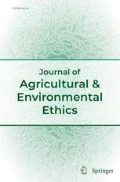Abstract
In the face of criticisms about the current generationof agricultural biotechnology products, some proponents ofagricultural biotechnology offer a ``future benefitsargument''(FBA), which is a utilitarian ethical argument thatattempts to justify continued R&D. This paper analyzes severallogical implications of the FBA. Among these are that acceptanceof the FBA implies (1) acceptance of a precautionary approach torisk, (2) the need for a more proportional and equitabledistribution of the benefits of agricultural biotechnology, andmost important, (3) the need to reorient and restructurebiotechnology R&D institutions (and the agriculturalbiotechnology community's values and attitudes) so that futurebenefits are indeed achieved through agricultural biotechnology.
Similar content being viewed by others
REFERENCES
Burkhardt, J., “Scientific Values and Moral Education in the Teaching of Science,” Perspectives on Science 7(1) (1999).
Burkhardt, J., “Business Ethics: Ideology or Utopia?” Metaphilosophy 10(2) (1985).
Buttel, F., “The Global Impacts of Agricultural Biotechnology: A Post-Green-Revolution Perspective,” in T. B. Mepham, G. A. Tucker, and J. Wiseman (eds.), Issues in Agricultural Bioethics (Nottingham University Press, Nottingham, 1995).
Council for Biotechnology Information (CBI) (<www.whybiotech.com>, 2000).
Drucker, S. A., “Why FDA Policy on Genetically Modified Foods Violates Sound Science and US Law,” Statement delivered before US Food and Drug Administration Panel on Scientific, Safety and Regulatory Issues. Washington, DC, November 30, 1999. <http://www.psrast.org/drukerfda.htm>.
Food and Agricultural Organization of the United Nations, “FAO Statement on Biotechnology” (2000) <www.fao.org/biotech/state.htm>.
Grossman, R. and B. Koppel, “The Release of Bioproducts for Agriculture: Environmental and Health Risks,” in S. M. Gendel, A. D. Kline, D. M. Warren, and F. Yates (eds.), Agricultural Bioethics (Iowa State University Press, Ames, IA, 1990).
Habermas, J., “Discourse Ethics: Notes on a Program of Philosophical Justification,” in S. Benhabib and F. Dallmyr (eds.), The Communicative Ethics Controversy (MIT Press, Cambridge, MA, 1990).
Hadwiger, D., The Politics of Agricultural Research (University of Nebraska Press, 1982).
Hansen, M., “Genetic Engineering Is Not an Extension of Conventional Plant Breeding” (1999), <www.biotech-info.net/wide_crosses>.
Ho, M. W. and R. Steinbrecher, “Fatal Flaws in Food Safety Assessment: A Critique of the Joint FAO/WHO Biotechnology and Food Safety Assessment Report” (Open University, Milton Keynes UK, 1996).
Johnson, D. J., “A Defense of Modern Biotechnology,” OECD Observer (June 9, 2000) <http://www.oecdobserver.org/news/fullstory.php3?aid=1>.
Jonas, H., The Imperative of Responsibility (University of Chicago Press, Chicago, IL, 1984).
Krimsky, S., “The Cultural and Symbolic Dimensions of Agricultural Biotechnology,” in T. B. Mepham, G. A. Tucker, and J. Wiseman (eds.), Issues in Agricultural Bioethics, (Nottingham University Press, Nottingham, 1995).
Mill, J. S., Utilitarianism (Oxford University Press, Oxford, 1998[1863]).
Miller, H. I., “Substantial Equivalence: Its Uses and Abuses,” Nature Biotechnology 17 (1999).
UN Organization for Economic Cooperation and Development (OECD), “Summary of Data from OECD's Database of Field Trials,” OECD Biotrack Online (2000) <www.oecd.org/eng/summary>.
Rural Advancement Foundation International (RAFI), “Terminator 2 Years Later: Suicide Seeds on the Fast Track,” RAFI Communique (March/April 2000) <www.rafi.org>.
Rollin, B., The Frankenstein Syndrome: Ethical and Social Issues in the Genetic Engineering of Animals (Cambridge University Press, New York, 1995).
Stallman, B., “Food Companies Yielding to Anti-Biotech Pressure,” The AG Agenda. American Farm Bureau Federation (April, 2000).
Thompson, P. B., “Discourse Ethics for Agricultural Biotechnology: Its Limits and Its Inevitability,” Science and Engineering Ethics 6 (2000).
Thompson, P. B., Food Biotechnology in Ethical Perspective (Blackie Academic, London, 1998).
Union of Concerned Scientists (UCS), “Biotechnology Policy,” (1999) <www.ucusa.org>
Author information
Authors and Affiliations
Rights and permissions
About this article
Cite this article
Burkhardt, J. Agricultural Biotechnology and the Future Benefits Argument. Journal of Agricultural and Environmental Ethics 14, 135–145 (2001). https://doi.org/10.1023/A:1011326403412
Issue Date:
DOI: https://doi.org/10.1023/A:1011326403412




